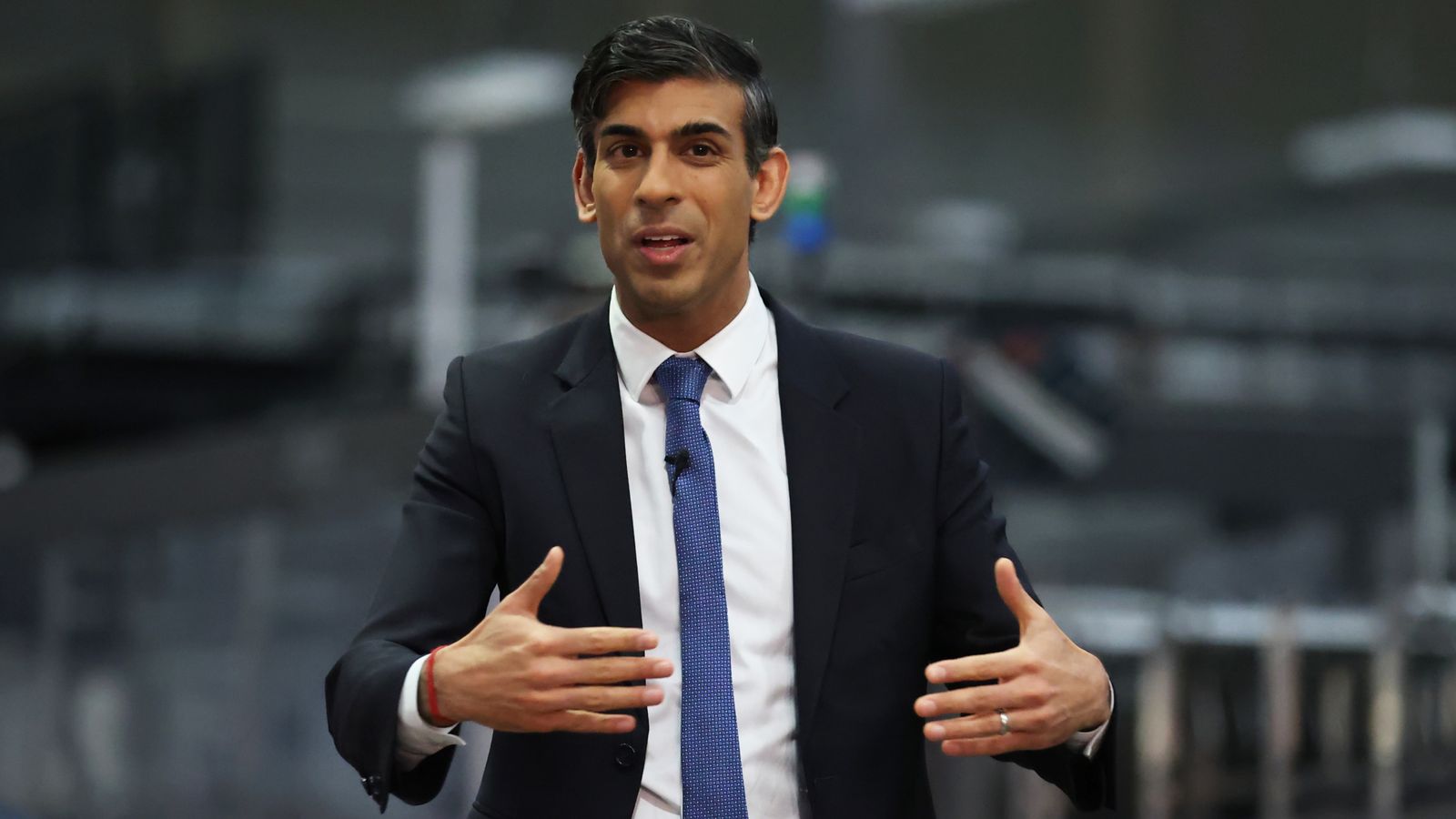Rishi Sunak has said his new post-Brexit deal puts Northern Ireland in an “unbelievably special position” because it gives it access to both the UK and European Union markets.
The prime minister said implementing the newly negotiated Windsor Framework would create “the world’s most exciting economic zone” with international companies “queuing up to invest” in the region.
“If we get this right, if we get this framework implemented, if we get the Executive back up and running here, Northern Ireland is in the unbelievably special position – unique position in the entire world, European continent – in having privileged access, not just to the UK home market, which is enormous… but also the European Union single market,” he said on a visit to Lisburn’s Coca-Cola factory.
Politics live: Sunak ‘over the moon’ with deal as he tours Northern Ireland to get DUP onside
“Nobody else has that. No one. Only you guys: only here, and that is the prize.”
The comments depart from the government’s previous position of avoiding any overt recognition of the benefits of a closer trading partnership with the EU.
The whole of the UK had access to the single market before Brexit, which Mr Sunak voted for.
Naomi Long, the leader of Belfast’s Alliance party, tweeted@ “Nobody else has that.” Well, you did, actually. Plus, the opt outs. But you binned it for Brexit. Go figure…”
The prime minister went on: “I can tell you, when I go around the world and talk to businesses, they know that – they’re like: ‘That’s interesting. If you guys get this sorted, then we want to invest in Northern Ireland, because nowhere else does that exist.’
“That’s like the world’s most exciting economic zone.”
He said the government aims to work with international companies to help them “take advantage of Northern Ireland’s very special position”.
“And they are queuing up to do so, particularly from the US actually.”
Politics and business correspondent
A striking moment from the Q&A was Rishi Sunak’s enthusiastic celebration of Northern Ireland having access to both UK markets and the EU, which he described as “an unbelievably special position”.
This is a significant departure from the government’s previous position – any overt recognition of the benefits of a closer trading partnership with the EU has always been anathema to Brexiteers and steadfastly avoided.
While many business leaders in Northern Ireland previously supported the Northern Ireland Protocol because of the dual access they enjoyed as a result, with the de facto border in the Irish Sea so unpalatable to unionists leaders in Westminster have not wanted to dwell on the benefits of a closer relationship with the EU.
But today Mr Sunak has been waxing lyrical about the “prize” enjoyed by Northern Ireland under the framework and “the world’s most exciting economic zone”.
And the PM is holding out the prospect of huge economic investment to businesses there as a result, promising that the government will help companies take advantage of this situation.
He claims organisations in the US are “queueing up” to get involved. This argument is much more of a carrot than a stick approach – a mark of the PM’s confidence (unsurprisingly for a former chancellor) in the importance of economic incentives.
PM ‘not endorsing single market’
Speaking after the visit, Downing Street stressed the comments should not be seen as the prime minister endorsing EU single market benefits for the whole of the UK.
The PM’s spokesman said the British people made their decision in 2016 in the Brexit referendum but Northern Ireland needed access to both markets because of its unique situation.
“With regards to Northern Ireland, it is simply a fact that because of our respect for the Good Friday Agreement and the central importance; Northern Ireland’s unique position means it needs to have access to both markets, not least to avoid a border on the island of Ireland, which nobody wants to see.
“That puts it in a unique position and what the framework does is finally cement those capabilities.”
Boris Johnson’s “oven ready” Brexit deal took the UK out of the single market but kept Northern Ireland closely aligned to it in order to avoid a hard border on the island of Ireland.
However, this effectively placed a customs border in the Irish Sea, with extra checks required on goods crossing from Great Britain into Northern Ireland – something the former PM promised would not happen.
Mr Sunak has spent months trying to negotiate new terms to replace the contentious Northern Ireland protocol and on Monday made a “historic breakthrough” as he signed a new deal with the EU on the post-Brexit trading arrangements.
The Windsor Framework has eased checks on goods from the UK while maintaining free flowing trade on the island of Ireland.
Please use Chrome browser for a more accessible video player
Read More:
Five key sections of the new Brexit deal for Northern Ireland
Rishi Sunak seeks to secure backing from Northern Ireland parties for post-Brexit deal
The agreement does mean Northern Ireland must continue following Brussels’ trade rules, but the PM has negotiated a ‘Stormont brake’ which allows the devolved government to block any EU law changes from coming into force in the region.
Mr Sunak said he believed “hand on heart” that it addressed the concerns expressed about the current set up, which triggered the collapse of power-sharing in Stormont.
Northern Ireland has been without an Executive Assembly since early last year, when the Democratic Unionist Party (DUP) pulled out of Stormont in protest at the Protocol.
DUP leader Sir Jeffrey Donaldson said “there remain key issues of concern” regarding the new deal despite “significant progress” made.
However he insisted his party would be “reasonable” as it spends the next few days studying the framework.
The PM is also facing the challenge of winning over Tory Eurosceptics and his predecessor Mr Johnson, who is yet to give a verdict on the Windsor Framework.
Mr Sunak indicated he had discussed the deal with Mr Johnson, telling the BBC earlier on Tuesday “of course I speak to the former prime minister”.
Tory Brexiteers in the European Research Group (ERG) are to meet later today and will convene MP Sir Bill Cash’s so-called “star chamber” of lawyers to scrutinise the deal before deciding whether to back it.









